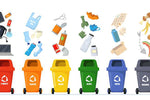
The Consumer's Guide to Making Recycling Work
, by Planet Green, 3 min reading time

, by Planet Green, 3 min reading time
Consumer Recycling is a collective responsibility that starts at home. It's not someone else's problem, and we can't simply toss our waste into the recycling bin and expect it to magically save the environment. As consumers, to truly make a difference, we need to understand how recycling works and actively participate in the process to ensure that recycling efforts are effective and environmentally friendly.
First, understanding the need for recycled products. Recycling begins with a demand for recycled materials. Just throwing plastics into the weekly recycle bin isn't enough to save the environment, especially if no-one wants that material for any kind of recycling. The quality of the items being recycled, along with their proper disposal, significantly impacts the recycling process. Here are some key points to consider:

It’s important to know what can and what can’t be recycled. This may be different in your community when compared to someone else’s. To be effective recyclers, consumers must educate themselves about what items can and cannot be recycled. This knowledge is the foundation of responsible recycling. Here are some tips to help:
To complete the recycling cycle, consumers should support the use of recycled and remanufactured products. Here's how consumers can further contribute to a circular economy:
Recycling isn't just a buzzword; it's a vital practice that every consumer can participate in to protect our environment. By understanding the need for recycled products, knowing what can and can't be recycled, and supporting a circular economy, consumers can make a meaningful impact on reducing waste and conserving resources.

Pinellas County, Florida, has taken a significant step in combating plastic waste by adding Planet Green Recycle to its public-facing information website. Residents and businesses...

The Holiday Spirit Meets Sustainability The holiday season is a time for giving, celebrating, and creating memories. It’s also a time when we tend to...

With November 15th being celebrated as America Recycles Day, the Plastics Industry Association (PLASTICS) commemorates Recycling Week this year from November 11th through November 15th...

Plastic pollution has become one of the most pressing environmental issues of our time, impacting land, waterways, and marine life on a global scale. While...